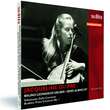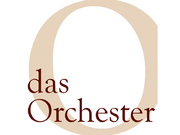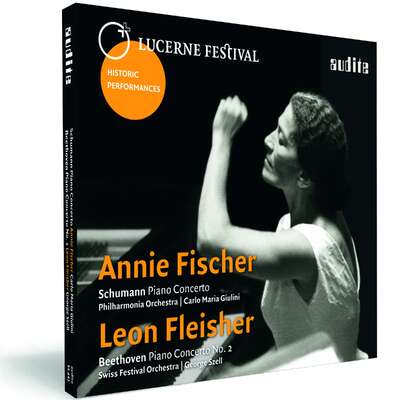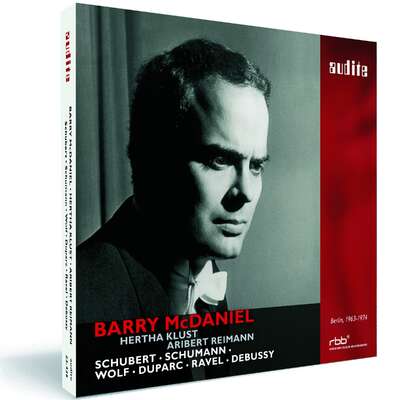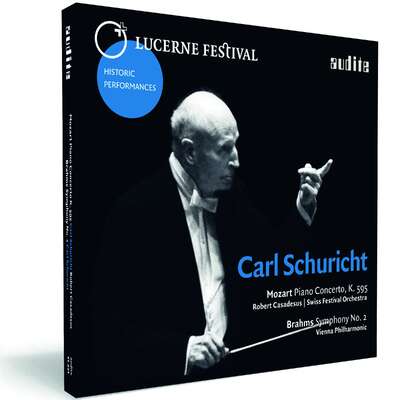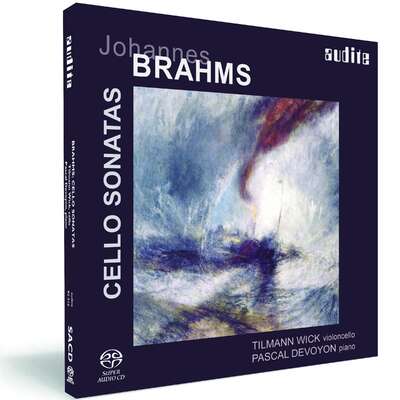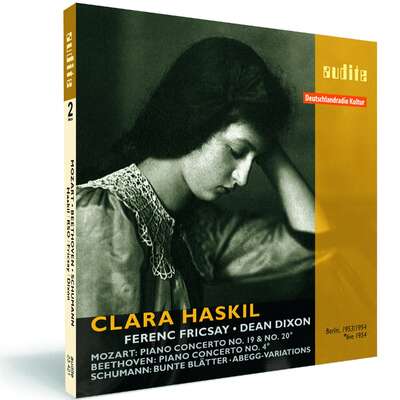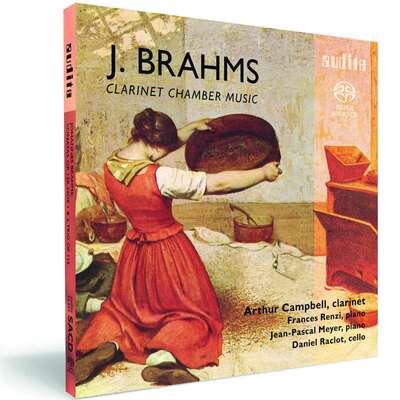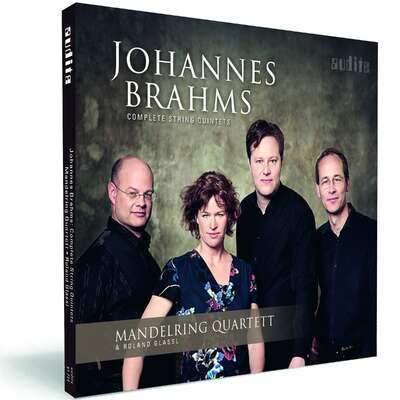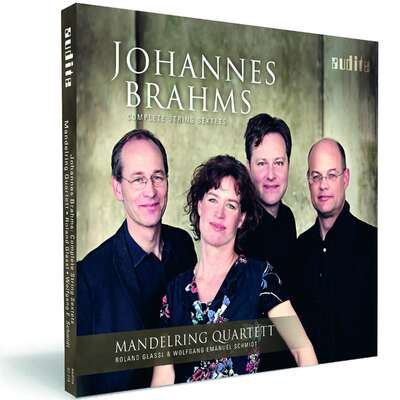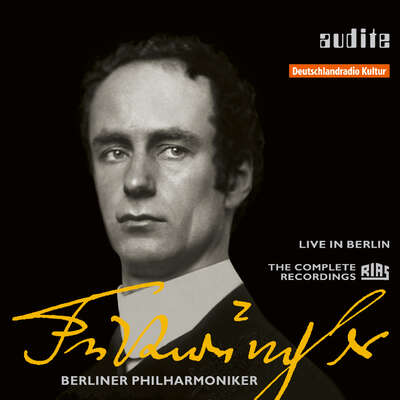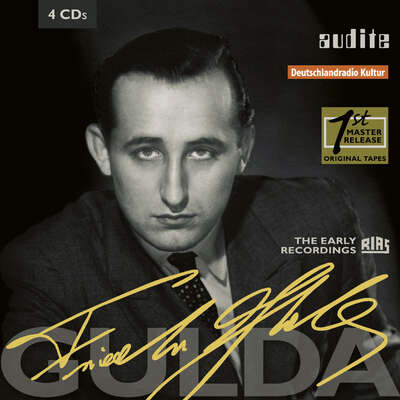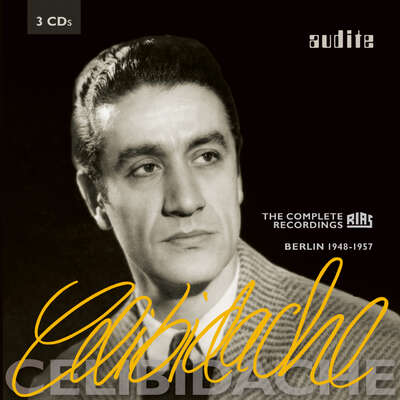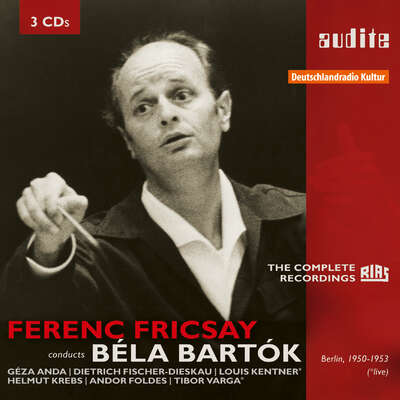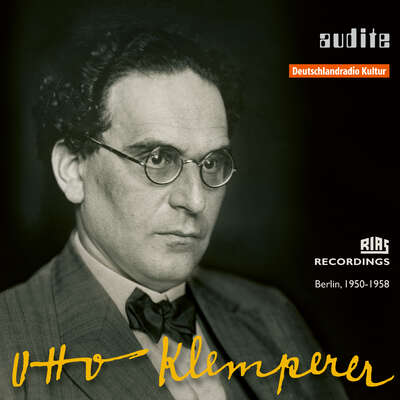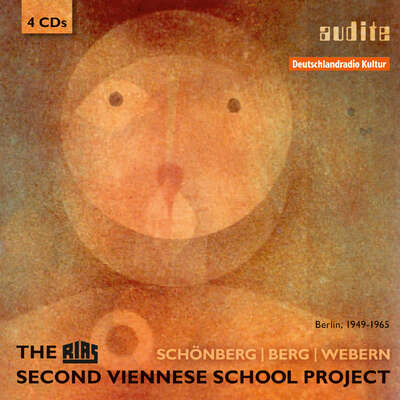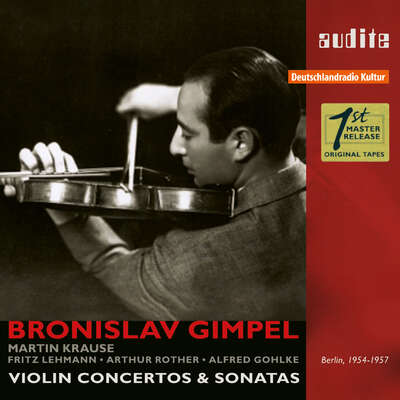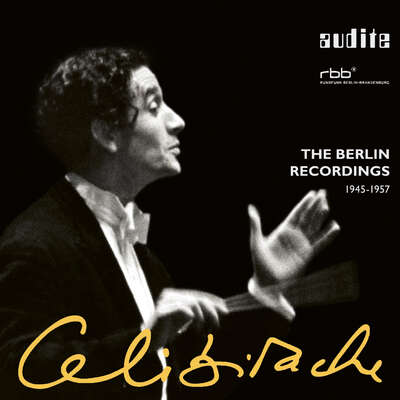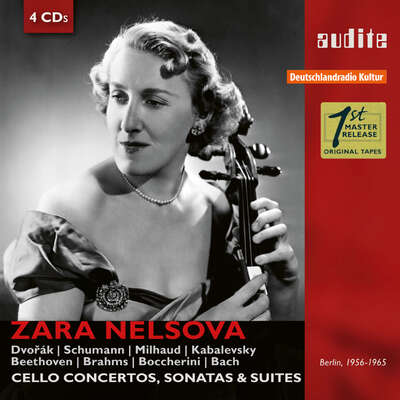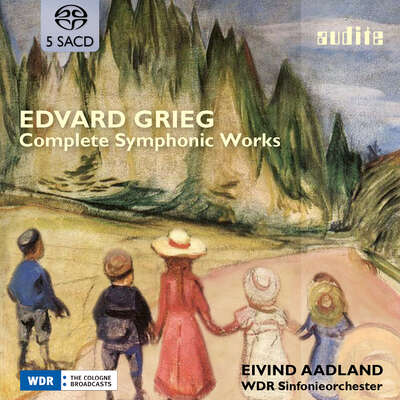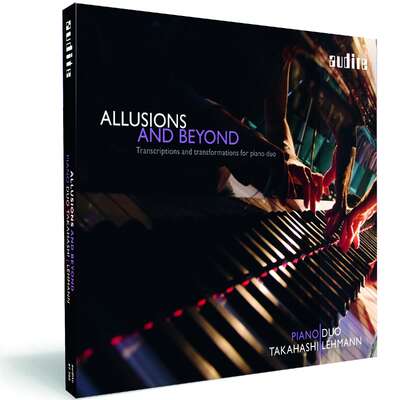
Two live documents of a great moment in Berlin’s post-war musical life: on 5 March 1963 the 18-year-old cellist Jacqueline du Pré and the 22-year-old pianist Bruno Leonardo Gelber made their solo concerto débuts. The poetry, energy and musical coherence of du Pré’s interpretation of the Schumann Cello Concerto rank alongside her later recording of the piece. Gelber managed to elicit from Brahms’ First Piano Concerto the full drama, forging a bridge not only across the long first movement, but across the entire work.more
"As always, the sound quality on this Audite disc is world class, as are the performers." (Strings Magazine)
Details
| Robert Schumann & Johannes Brahms: Cello Concerto, Op. 129 & Piano Concerto, Op. 15 | |
| article number: | 95.622 |
|---|---|
| EAN barcode: | 4022143956224 |
| price group: | BCB |
| release date: | 7. June 2013 |
| total time: | 76 min. |
Bonus Material
-
Producer's Comment
First-hand impressions of producer Ludger Böckenhoff [German]
-
press kit
press kit_du Pré_Gelber_Albrecht
- press kit
-
Informationen
As part of its series of historic recordings, the audite label presents another notable jewel. On 5 March 1963 two great virtuosos made their Berlin débuts with orchestra in the same concert: the then 18-year-old cellist Jacqueline du Pré and the 22-year-old pianist Bruno Leonardo Gelber. Du Pré's interpretation of the Schumann Cello Concerto seems more vivid and contains greater contrasts even than her later recording of the work. With his reading of Brahms' First Piano Concerto, Gelber communicates a conception of a large-scale work, shaping the inner contrasts and connections without ever losing sight of the overall coherence. For everyone who is interested in the history of interpretation, these two live documents of a great moment in Berlin's post-war musical life are a must.
This CD forms part of our series "Legendary Recordings" and bears the stamp "1st Master Release". This term stands for the exceptional quality of audite's archive releases which are all, without exception, produced using original tapes from the radio archives. Usually, these are the original analogue tapes with tape speeds of up to 76 cm/s which are of astonishingly high quality, even by today's standards. In addition, the process of re-mastering - executed with professional expertise and sensitivity - reveals hitherto hidden details of the interpretations, creating a sonic image of superior quality. CD releases produced from private recordings of radio broadcasts or old 78rpm records cannot match this level of sound quality.
Reviews
www.amazon.de | 26. Oktober 2014 | October 26, 2014 | source: https://www.amaz... Kundenrezension: Sternstunde
Was für eine Aufnahme des Schumann-Konzerts!<br /> Selten habe ich eine Mono-Einspielung gehört, die in Sachen Transparenz und Weiträumigkeit (!) soMehr lesen
Selten habe ich eine Mono-Einspielung gehört, die in Sachen Transparenz und Weiträumigkeit (!) so überzeugt. Dass der Mono-Klang den Zuhörer – eine nicht zu zaghafte Lautstärkeregelung vorausgesetzt – zudem in einer Unmittelbarkeit anspringt, wie es keiner Stereo-Einspielung je gelingen wird, versteht sich von selbst und kommt der Interpretation einer Künstlerin von der Ausdruckskraft einer Jacqueline du Pré ideal entgegen. Mit gerade 18 Jahren gab sie damals in Berlin ihr Konzert-Debut und man wünscht sich, die aktuelle junge Generation von Künstlern würde neben der technischen Souveränität auch diesen Mut zu einer kein Risiko scheuenden musikalischen Leidenschaft aufbringen. Inklusive eigener Kadenz. Natürlich ist dies keine "Referenzaufnahme" – aber wer diese für sich schon gefunden hat, für den ist diese Aufnahme des Schumann-Konzerts ein echtes Muss, eine Sternstunde der klassischen Musik. Und als "Zugabe" findet sich mit Bruno Leonardo Gelber eine ebenfalls eindringliche und technisch hochwertige Aufnahme des ersten Klavierkonzerts von Brahms vom gleichen Konzertabend – was will man mehr?
Selten habe ich eine Mono-Einspielung gehört, die in Sachen Transparenz und Weiträumigkeit (!) so
Diapason | No. 621 Février 2014 | Jean-Charles Hoffelé | February 1, 2014 Johannes Brahms
Berlin, 5 mars 1963: un trio de jeunes interprètes met le feu aux poudres pour un concert assez mémorable, mais avec un bémol d'importance. GerdMehr lesen
Fanfare | 27.01.2014 | Lynn René Bayley | January 27, 2014
This CD presents the first-ever releases of the Berlin Radio Symphony concert of March 1963, in which 18-year-old Jacqueline du Pre; and 22-year-oldMehr lesen
But of course, the real focus here is du Pre and to be honest, either she wasn’t in her best form or the recording isn’t particularly good. She sounds slightly flat in places and the tone is particularly muddy, a quality which is the antithesis of every other recording and performance I’ve ever heard by her. Yet at times, the string section of the orchestra also sounds a little muddy, not so much as du Pre’s own playing but not terribly clear, either; and since the sound of her cello clears up after the first six minutes or so, I would put the blame on the tape. An anonymous reviewer on ArkivMusic website claims that this performance seems more vivid and contains greater contrasts even than her later recording of the work, but unless you’re willing to tolerate the peculiar sonics (which I find tolerable only in really old broadcasts of pre-World War II vintage) I would not recommend this disc. If you love this Concerto, and particularly du Pre’s unique way with it, try to track down the superb 1967 Avery Fisher Hall performance with Leonard Bernstein and the New York Philharmonic. (I didn’t much like her studio recording of this work; the tempo sags in the second movement to the point of musical collapse.)
Regarding the Brahms First, I’m reminded of Toscanini’s famous dictum: Germans always conduct their music too slow! Well, not always: there were Erich and Carlos Kleiber, Fritz Busch, and several others who didn’t normally do so, but Albrecht’s tempos and particularly his phrasing are positively leaden. Consider: this performance clocks in at 50:33, almost a full five minutes longer than the superb recording by Artur Rubinstein with Fritz Reiner on RCA/BMG! Within this uninspiring and uninspired framework, however, Gelber gives a good account of himself. His playing is lightweight but elegantly phrased and with some subtle nuances.
Thus, a split review of sorts. If you’re a Gelber fan, you might wish to add this to your collection despite Albrecht’s uninspired conducting, but the rest of us can safely skip it.
American Record Guide | 15.01.2014 | David Radcliffe | January 15, 2014
Unlike too many off-the-air transcriptions, this concert of 5 March 1963 is of compelling interest. It was part of a radio series devoted to musiciansMehr lesen
The Argentinean pianist Bruno Leonardo Gelber (b. 1941) is less well known. I imagine that listeners in 1963 might have been able to predict what the future held in store for them, for while Gelber plays with great heart and obviously pleased the Berlin audience, he lacks the last degree of manual dexterity that is so obvious in Du Pre’s performance.
The conductor, Gerd Albrecht (b. 1935), was also making his Berlin debut and acquits himself with honors; he would go on to become a politically controversial conductor of the Czech Philharmonic in the 1990s. Setting all the history aside, I believe anyone coming to this recording blind would enjoy the gripping spontaneity one looks for in undiluted concert performances of familiar classics.
Westdeutsche Zeitung | Mittwoch, 8. Januar 2014 | Dr. Lars Wallerang | January 8, 2014 Zwei Sternstunden
Die gerade erst 18-jährige du Pré entlockte ihrem Instrument in Robert Schumanns Cellokonzert jenen subtilen Ausdruckszauber, für den sie in ihrer kurzen, durch Krankheit jäh beendeten Karriere berühmt wurde. Auch der knapp 22 Jahre alte Gelber war bereits auf der Höhe seines Könnens. Im 1. Klavierkonzert von Johannes Brahms beeindruckt er durch einen kraftvollen, aber auch feinsinnigen Anschlag. Die teuflischen Doppeltriller meistert er messerscharf, dass Funken zu fliegen scheinen.Mehr lesen
Le Devoir | 4 janvier 2014 | Christophe Huss | January 4, 2014
La version de Stephen Hough et Mark Wigglesworth des deux concertos deMehr lesen
BBC Music Magazine | Vol. 22 Number 1 (November 2013) | Helen Wallace | November 1, 2013
Two auspicious Berlin debuts from 1963. I8-year-old Du Pré’s ardour and identification with Schumann's work is irresistible, while Gelber's BrahmsMehr lesen
Das Orchester | 11/2013 | Anna Catharina Nimczik | November 1, 2013
Du Pré zeigte bereits in jungen Jahren den ihr eigenen musikalischen Stil: impulsive Interpretationen gepaart mit großem, äußerst expressivem Ton. Doch auch lyrische Momente lagen der Cellistin nicht fern. [...] Der argentinische Pianist Bruno Leonardo Gelber [...] überzeugt mit klarem Klang und differenzierter Ausgestaltung der einzelnen Motive, ohne den Blick für den großen Zusammenhang der Komposition zu verlieren.Mehr lesen
www.concertonet.com | 17.10.2013 | Gilles d’Heyres | October 17, 2013 Du Pré, Gelber: une même passion fougueuse
L’œuvre s’achève dans un tourbillon de rythmes, presque violent mais d’une fougue rafraîchissante.Mehr lesen
Gramophone | October 2013 | Rob Cowan | October 1, 2013 Contrasting virtuosos in theiry youthful prime
On the same day that The Beatles recorded 'From me to you' and the country singer Patsy Cline died in a plane crash (aged 30), two fine youngMehr lesen
Strings Magazine | October 2013 | Laurence Vittes | October 1, 2013
One year after her London concerto debut, then-18-year-old cellist Jacqueline du Pré played the Schumann Concerto in Berlin on March 5, 1963, overMehr lesen
A wild performance of reckless abandon and emotional impact, this previously unreleased recording puts the scope of her command on full display.
Like a method actor, du Pré sometimes takes a while to feel comfortable when a new movement or episode starts. It doesn't usually take long, and when she finds the right pace she produces hugely entertaining cello playing. Her phrasing of the double stops in the slow movement is sublime. She even plays a two-minute cadenza of her own devising for the last movement.
The cadenza begins like Haydn – formal, sane and grand – and then transforms into something more primitive, as dissonance and distortion alternate with moments of exalted Schumann beauty, always referencing the basic building blocks of the Concerto as only a cellist in love with it can. The climax comes in a poignant, hypnotic series o f triplets which demonstrate du Pré's disciplined, comprehensive approach to cello technique.
Du Pré's awareness of the Berlin Radio Symphony Orchestra is exceptional. Her dialogue with the French horn in the first movement is pure magic. And at the end of the last movement, when the orchestra is scrambling to finish together, she exerts enough control with the size and rhetorical breadth of her final two chords that she, the conductor, and the orchestra end on an appropriately triumphant, roughly unified note.
The CD also includes, from the same concert, another young phenom, then-22-yearold Argentine pianist Bruno-Leonardo Gelber, playing what would become one of his signature works, Brahms' D minor Piano Concerto. As always, the sound quality on this Audite disc is world class, as are the performers.
Fono Forum | Oktober 2013 | Norbert Hornig | October 1, 2013 Ante portas
Der Name Jacqueline du Pré steht für glühendes, hochemotionales Cellospiel. Hört man die großen Aufnahmen der Künstlerin, wie etwa die immerMehr lesen
In dem frühen Tondokument des RIAS Berlin sind die Grundzüge ihres künstlerischen Profils bereits deutlich erkennbar, die Urmusikantin trumpft selbstbewusst auf, und wohl jeder im Saal wusste, dass diese Musikerin ihren Weg souverän machen würde. Und so kam es dann auch. Im selben Berliner Konzert trat der junge argentinische Pianist Bruno Leonardo Gelber auf. Er begann wie du Pré als Wunderkind auf seinem Instrument und wurde ebenfalls von EMI unter Vertrag genommen. Das erste Klavierkonzert von Brahms spielte er für das Label zwei Jahre später mit den Münchner Philharmonikern unter Franz-Paul Decker ein, doch schon auf dem Podium der Berliner Musikhochschule präsentiert sich Leonardo Gelber als weitsichtiger Gestalter. Der Dritte im Bunde bei diesem denkwürdigen Konzert war der junge Dirigent Gerd Albrecht, auch er arbeitete mit Energie an seinem Karrierestart.
La Muzik | Oktober 2013 | October 1, 2013 Record Label Showdown
Chinesische Rezension siehe PDF!Mehr lesen
Musica | numero 250 - ottobre 2013 | Piero Rattalino | October 1, 2013
Anche Gelber è completamente padrone dello strumento e non manca inoltre della robustezza che è necessaria per reggere la pesantissima scrittura del pezzo.Mehr lesen
Kulimu | Jg. 39 (2013), Heft 2 | uwa | September 1, 2013
Beim Spiel von du Pré gehen intelligente Phrasierung und Klangphantasie eine beglückende Verbindung ein. Mehr lesen
www.musicweb-international.com | Tuesday August 20th | Stephen Greenbank | August 20, 2013
On 5 March 1963, two young artists gave a concert in Berlin in the ‘RIAS presents’ series. For three years the radio series had, in conjunctionMehr lesen
The two artists involved in the 1963 concert were the eighteen year old British cellist Jacqueline du Pré, and the Argentinean pianist Bruno Leonardo Gelber, who was twenty-one. Du Pré began learning the cello at the age of four and studied with William Pleeth. She also had tuition from Casals, Tortelier and Rostropovich. Tragedy struck in the early 1970s when she developed multiple sclerosis, dying at the age of forty-two in 1987. Gelber overcame polio to become a concert pianist and won a scholarship to study with Marguerite Long in Paris.
First on the programme for this disc is the Schumann Cello Concerto. In 1850, the Schumanns moved from Dresden to Düsseldorf. The change of surroundings brought about a creative upsurge in Robert, and within a few months he had composed the Rhenish Symphony, Scenes from Goethe’s Faust, some songs, and the present cello concerto. Amazingly it was composed in just fifteen days. Schumann was fond of the cello and played it for a while when a finger injury in 1832 put an end to his career as a pianist. He never achieved proficiency, but his dabbling gave him an understanding of the instrument and its possibilities. His cello concerto is in three linked movements. This both unifies the work and prevents the irritating habit of audiences applauding after each movement, a practice Schumann detested.
The Schumann Concerto is a compact work. It has been criticized for its not very adventurous orchestration. Indeed Joan Chissell, an authority on Schumann, makes the pertinent comment “… for though discretion is undoubtedly the better part of valour in accompanying the least penetrating of all solo instruments in a concerto, Schumann’s excessive caution frequently results in drabness”. This presents a problem for the conductor, as the orchestration is very sparse and exposed in places. Added to this is the flexibility and rubato in the solo part. Rostropovich even went so far as to ask Shostakovich to re-orchestrate the work, though I’ve never heard that version to compare.
When first listening to this CD, I was reminded of a DVD documentary about Jacqueline Du Pré, in which Sir John Barbirolli is interviewed countering the criticism from some quarters that her playing suffered from excessive emotion. I will always remember his wise words: “when you’re young, you should have an excess of everything. If you haven’t excess, what are you going to pare off as the years go by”. As can be expected, du Pré delivers a passionate and expressive performance. With beauty of tone the concerto is ravishingly played. The slow movement especially has a pervasive melancholy and wistfulness. It is truly heartfelt. The conductor Gerd Albrecht rises to the challenge with flying colours and gives the soloist more inspirational support than Daniel Baremboim does in the studio recording five years later. That said, the 1968 EMI recording does not flatter the New Philharmonia orchestral sound, which seems slightly recessed. In general, I find the present live performance more engaging and spontaneous than the studio event. The sound is remarkably good for a mono recording of this vintage. A similar performance I have from 3 March 1967 with Leonard Bernstein and the New York Philharmonic, live from Carnegie Hall, is also more free, natural and instinctive than the New Philharmonia version. Schumann provides an accompanied cadenza at the end of the third movement. Curiously du Pré inserts her own spectacular cadenza and picks up Schumann’s cadenza at the end. She does not do this in the recordings with Barenboim and Bernstein. This is not as unusual as it may at first appear. Shafran, Fournier and Tortelier added their own cadenzas at the same juncture.
Brahms composed his First Piano Concerto at the age of twenty-five in 1858, and gave the first performance a year later in Hanover, Germany. The work had a lengthy gestation period, starting as a symphony, then a sonata for two pianos, and finally as a concerto in the form we know it today. It is large in scale and the piano and the orchestra take on equal roles.
A few months ago I reviewed Gelber in the Brahms Second Concerto with the NHK Symphony Orchestra. What impressed me with that magisterial account was Gelber’s formidable technique, enabling him successfully to achieve his vision and realization. Likewise with Brahms 1, he employs his prodigious artistry to deliver something of real stature. There’s tremendous energy here with Albrecht providing sympathetic support and sustaining the dramatic tension throughout. A good balance is achieved between the dramatic and the lyrical. The music is thoughtfully paced with both soloist and conductor having a clear understanding of the work’s towering architecture.
With first-class liner notes this is an admirable release enshrining two youthful renditions. These are valuable documents that should be required listening for collectors of historical instrumental performances. The disc gave me a great deal of pleasure. The sound, as I mentioned earlier, is exceptional for its age, and allows the music to emerge with definition and clarity.
Bayern 5 aktuell - Klassik CD-Tipp
| Samstag, 17.08.2013: Klassik CD-Tipp der Woche, 10.24 Uhr | Kristin Amme | August 17, 2013
Jacqueline du Pré und Bruno L. Gelber in Berlin
Vor 50 Jahren gaben die Cellistin Jacqueline du Pré und der Pianist Bruno Gelber ihr Berlin-Debüt. Für Kristin Amme der Klassik CD-Tipp der Woche – immer samstags um 10.24 Uhr, 12.24 Uhr und 14.25 Uhr auf B5 aktuell.
Sie war schön, exzentrisch und unangepasst. Eine mit bewegtem, mit intensivem Leben. Jacqueline du Pré. Mit fünf bekommt sie ihr erstes eigenesMehr lesen
Wunderkind Bruno Leonardo Gelber
Auch der in Argentinien geborene Pianist Bruno Leonardo Gelber galt wie du Pré einst als Wunderkind, und auch ihn traf eine schwere Krankheit: Mit fünf Jahren spielt er ganze Sonaten und Konzerte, mit sieben erkrankt er an Kinderlähmung. Ein Jahr lang muss er pausieren, dann setzt er sich wieder ans Klavier. Es folgen die ersten öffentlichen Konzerte. Mit Anfang 20 tourt er als Pianist durch ganz Europa. 1963, kurz vor seinem 22. Geburtstag, steht Gelber neben du Pré mit dem Radio-Symphonie-Orchester in Berlin auf der Bühne. Er spielt das Klavierkonzert Nr. 1 von Johannes Brahms.
Archivaufnahmen des Berlin-Debüts
Es heißt, Gelber sei einer der besten Brahms-Interpreten der Welt und du Pré eine kongeniale Schumann-Cellistin. Eine Behauptung, für die man sich am besten musikalischer Argumente bedient. Also zum Beispiel der kürzlich beim Label audite erschienenen CD, auf der die Archivaufnahme des Berlin-Debüts der beiden Künstler remastert wurde. Eine in jeder Hinsicht historische Aufnahme. Du Pré, diese impulsive Künstlerin, die sich beim Spielen verrenkte und verbog, die ihr Cello ungestüm bis hin zur Ruppigkeit bearbeitete, deren Kunst ist hier in all ihrer Leidenschaft dokumentiert.
Beste Klangqualität
Lebendig und expressiv auch Gelbers Interpretation des Brahmschen Klavierkonzertes Nr. 1. Lyrisch und kräftig tupft er die Töne aufs Klavier; das aber so bedacht und wohlüberlegt, so sinnlich, dass man sich fragt, warum dieser einst so umjubelte Pianist heute fast vergessen ist. Eine CD mit Sammlerwert, und in bester Klangqualität. Auch wenn man der Aufnahme ihre Archivtonbandherkunft kaum mehr anhört, so geht eines doch sofort ins Ohr: Dies hier ist keine glattpolierte Studioaufnahme. Nein, es ist eine Live-Einspielung zweier höchst begabter, blutjunger Solisten, die keine Angst haben sich auszuprobieren, sich auch mal auszutoben. Und das Ergebnis dieser Experimentierfreude? Eine unmittelbare, körperliche Musik, die einem Schauer über den Rücken treibt und einen bis ans Lächeln heran staunen lässt.
auditorium | August 2013 | August 1, 2013
koreanische Rezension siehe PDF!Mehr lesen
www.huffingtonpost.com | July 9, 2013 | Laurence Vittes | July 9, 2013
In a wild performance of reckless abandon and emotional impact, this first-time ever release puts the scope of her [Jaqueline du Pré] command on full display.Mehr lesen
BBC Radio 3 | 06.07.2013, 10.20 Uhr | David Owen Norris | July 6, 2013 BROADCAST Building a Library
Sendebeleg siehe PDF!Mehr lesen
Classica – le meilleur de la musique classique & de la hi-fi | no.154 (juillet-août 2013) | Stéphane Friédérich | July 1, 2013
Deux jeunes artistes promis a un bel avenir se produisirent le même jour,Mehr lesen
Märkische Oderzeitung | 24. Jg, Nr. 148 (28. Juni 2013) | p.p. | June 28, 2013 Am Beginn einer Weltkarriere
Sie waren jung und standen, was niemand ahnen konnte, am Beginn einerMehr lesen
HFP Online - Hifi - Hazimozi - Multimedia | 2013. június 25. | Mihály Czékus | June 25, 2013
Mindig van abban valami izgalmas, amikor az archívumok mélyéről régiMehr lesen
http://theclassicalreviewer.blogspot.de | Thursday, 13 June 2013 | June 13, 2013 Rare performances from Jacqueline du Pré and Bruno Leonardo Gelber on a historic release from Audite
The 22 year old Gelber certainly had a formidable technique with such freedom and fluency. [...] Whether this performance can dislodge Weisenberg I’m not sure. It certainly runs him close.<br /> Audite have done a great service in making these performances available. No admirer of these artists will want to miss these great performances.Mehr lesen
Audite have done a great service in making these performances available. No admirer of these artists will want to miss these great performances.
Audiophile Audition | June 11, 2013 | Gary Lemco | June 11, 2013
The concert of 5 March 1963 at the Berlin Hochschule fuer Musik, GreatMehr lesen
www.pizzicato.lu | 07/06/2013 | Remy Franck | June 7, 2013 Ein wichtiges und spannendes Dokument
Es hatte Schumann wirklich gepackt: Im Oktober 1850 komponierte er binnen weniger Tage und ganz im Feuereifer der Euphorie, in die ihn sein Umzug vonMehr lesen
Im Berliner Schumann-Konzert findet sich alles, was du Pré ausmacht: Unbändige Leidenschaft, feuriger Schwung, kräftige Akzente, und dazwischen immer wieder auch hinreißende Legatobögen von beseeltem Lyrismus. Eine herausragende, mitreißende Interpretation!
Bruno Leonardo Gelber war, als er das Brahms-Konzert in Berlin aufführte, fast 22 Jahre alt, und schon ein erfahrener Konzertpianist. Vom Aufführungstrio dieses Konzerts war Gerd Albrecht, damals designierter Generalmusikdirektor in Lübeck, mit seinen 27 Jahren der Älteste.
Brahms ist der Komponist, den man am ehesten mit Gelber assoziiert. Sein klarer schlanker und nie schwerer Klang im Ersten Brahms-Konzert hatte mich schon fasziniert, als seine erste Aufnahme davon erschien (1967 mit dem Grand Prix du Disque ausgezeichnet). Wenige Jahre später hörte ich in demselben Werk in Paris, und die in meinen Erinnerungen eingravierte Interpretation deckt sich weitgehend mit dem, was ich in diesem Berliner Konzertmitschnitt höre, bis auf das Adagio, das hier eine unglaubliche Tiefe und eine wunderbare Reflektivität erlangt, an der wiederum nichts Schweres zu entdecken ist.
Was an dieser CD beeindruckt, ist der geeinte Geist, aus dem Dirigent und Solisten heraus musizieren. Einer solche Harmonie, ein solch dezidiertes: ‘Das tun wir jetzt gemeinsam und gut’, ist bemerkenswert.
Listen to these young masters at work and you won’t regret it: Du Pré is frenetic in the fiery Schumann Concerto. In the outer movements of the Brahms Concerto Gelber plays brilliantly, his tone being slender and vivid. His Adagio has depths and charming lyricism.
Un trio de jeunes maîtres soudés dans un esprit commun, assure le succès de ce live de 1963: Du Pré se donne corps et âme à Schumann pour faire ressortir tout l’élan avec lequel le compositeur avait composé son œuvre endéans quelques jours. Avec un son remarquablement clair et élancé dans les mouvements latéraux et une profondeur lyrique charmante dans l’Adagio Gelber signe un Brahms correspondant parfaitement à son image de marque.
RBB Kulturradio | Mo 03.06.2013 | Kai Luehrs-Kaiser | June 3, 2013
Robert Schumann: Cello-Konzert / Johannes Brahms: Klavierkonzert Nr. 1
Eine phänomenale Entdeckung: Die Aufnahme des Debüts von Jacqueline du Pré und Bruno Leonardo Gelber aus dem Jahr 1963
Ein erstaunliches Doppel-Debüt begab sich am 5. März 1963 im Konzertsaal der Hochschule der Künste (die Philharmonie war damals noch nichtMehr lesen
Zum Kern der Sache
Von ingeniöser Ruppigkeit und Impulsivität strotzte schon damals das Spiel der noch weitgehend unbekannten Jacqueline du Pré. Ihr London-Debüt hatte sie im Vorjahr absolviert. Erste Studioaufnahmen lagen noch weit vor ihr. Ebenso die Bekanntschaft mit ihrem späteren Ehemann Daniel Barenboim. Ihr großer, schürfender Ton hat keinerlei Angst anzuecken, schlägt expressiv über die Strenge und geht jedes technische Risiko ein. So kriegt Schumann ein Maß von musikalischer 'Ungepflegtheit' und Erdigkeit zurück, mit dem die Solistin unbeirrt originell zum Kern der Sache vorstößt. Am Charakteristischsten wohl der 'hummelige' Ton von aggressiver Agilität und Ausdruckskraft. Phantastisch! Und weit ungezähmter als in den Studio-Aufnahmen dieser tragisch mit 42 Jahren an den Folgen ihrer Multiple sklerose-Erkrankung verstorbenen Künstlerin.
Große pianistische Eloquenz
Auch mit der Karriere des argentinischen Pianisten Bruno Leonardo Gelber, früher regelmäßiger Gast in der Philharmonie, verbindet sich eine Krankengeschichte. Er debütierte mit acht Jahren, kurz nach einer überstandenen Polio-Diagnose. Der Ex-Kommilitone von Martha Argerich hatte 1963 sein Studium bei der legendären Marguerite Long wohl gerade beendet (und den Long-Thibaut-Wettbewerb mit dem 3. Preis abgeschlossen). Er blieb auch später immer eine sphinxhafte Erscheinung (und ist mir trotz vieler Live-Eindrücke ein Rätsel geblieben). Hier erlebt man seinen tropfig silbrigen Ton, der von großer pianistischer Eloquenz zeugt. Obwohl Brahms, als er das Werk komponierte, nicht sehr viel älter war als Gelber zum Zeitpunkt dieser Aufnahme, klingt es doch ein bisschen, als ob der Schüler dem Lehrer die Hefte korrigiert. Was hier allerdings eher zu einem reizvollen Silberblick des Ganzen führt.
Auch das RSO unter Gerd Albrecht mag damals nicht über die klangliche Rundheit von heute verfügt haben. Trotzdem: Eine phänomenale Entdeckung. Wie stets bei Audite in bester klanglicher Konservierung – weil direkt vom Mutter-Band abgenommen.
